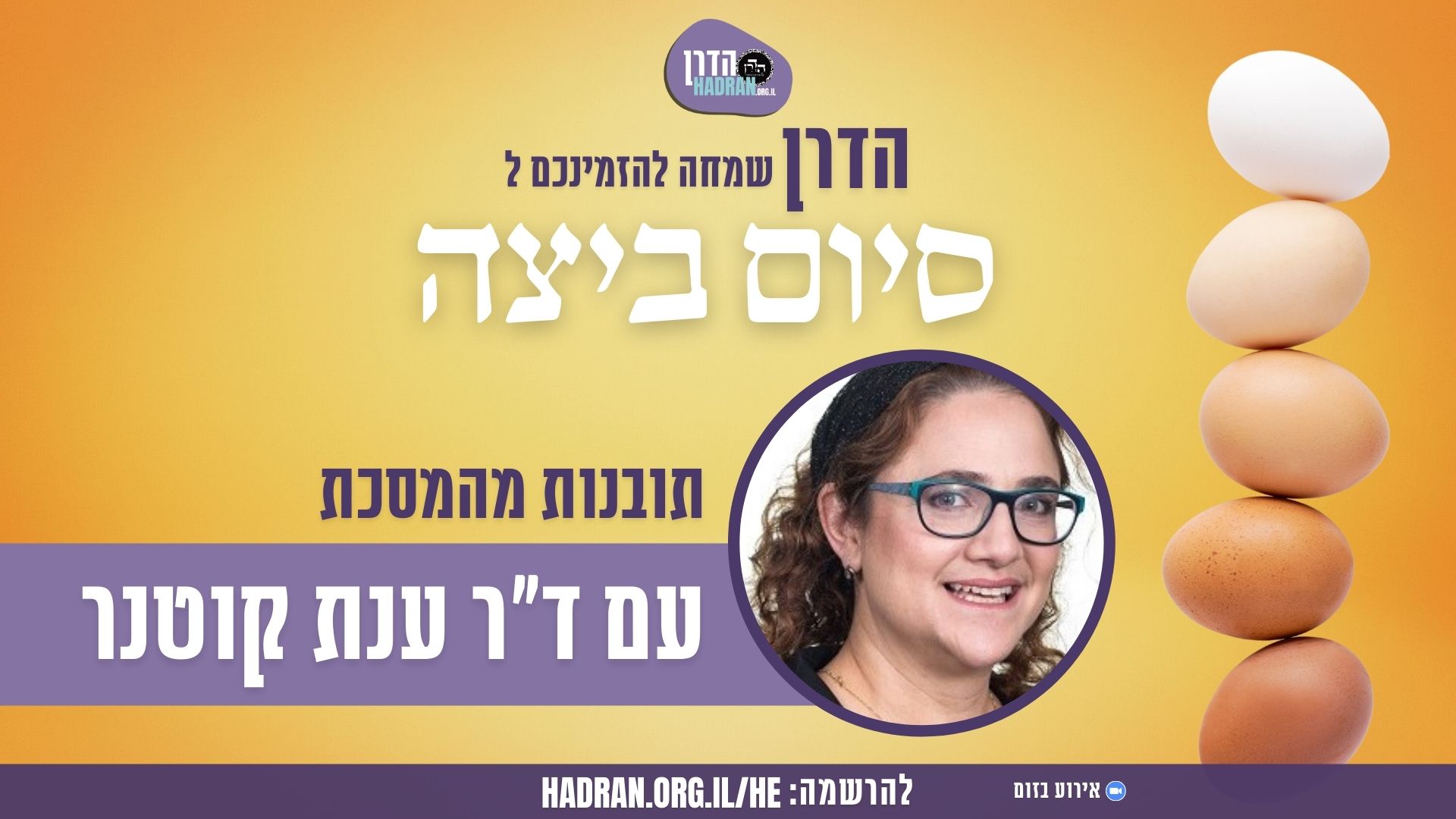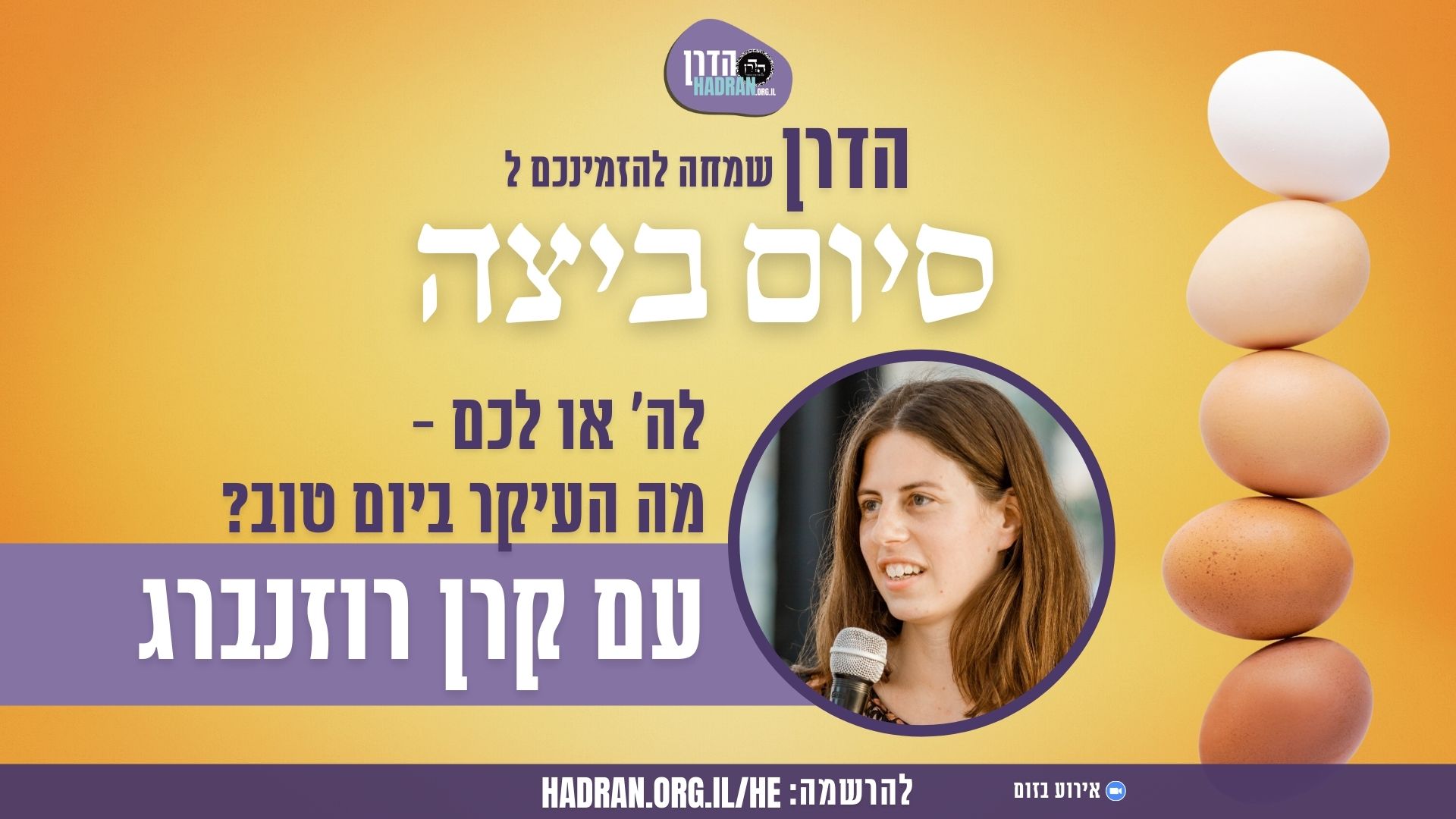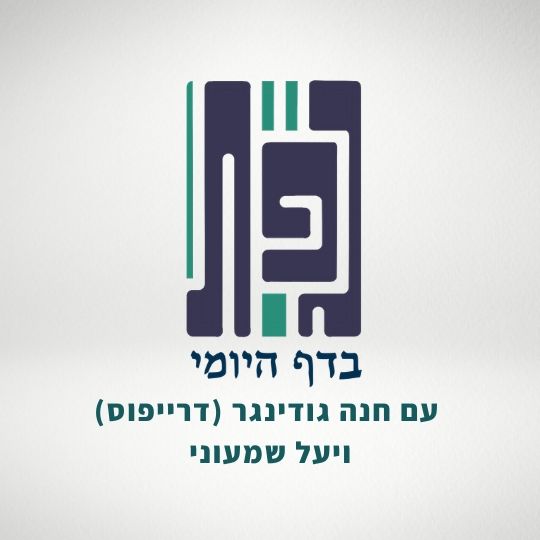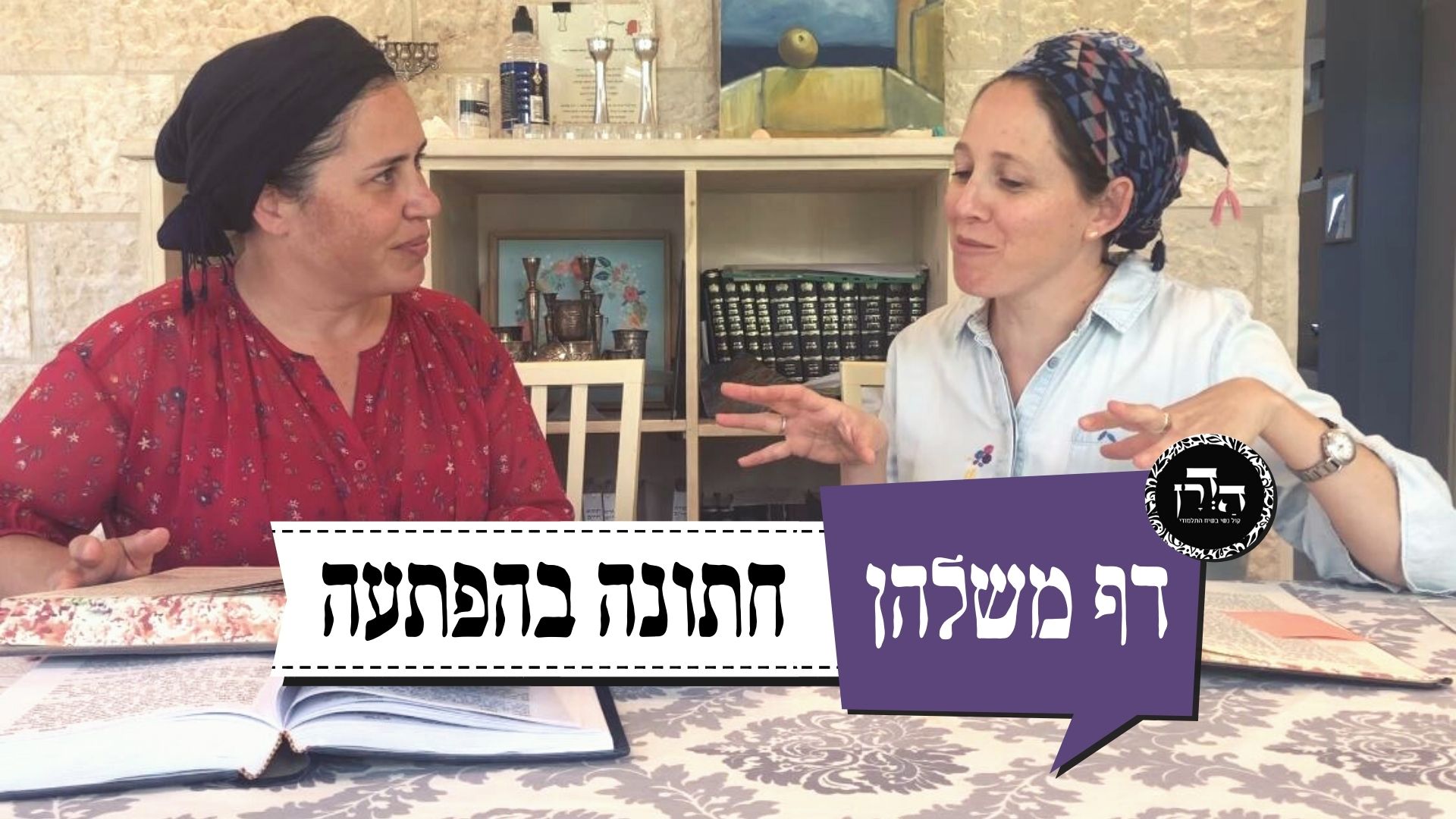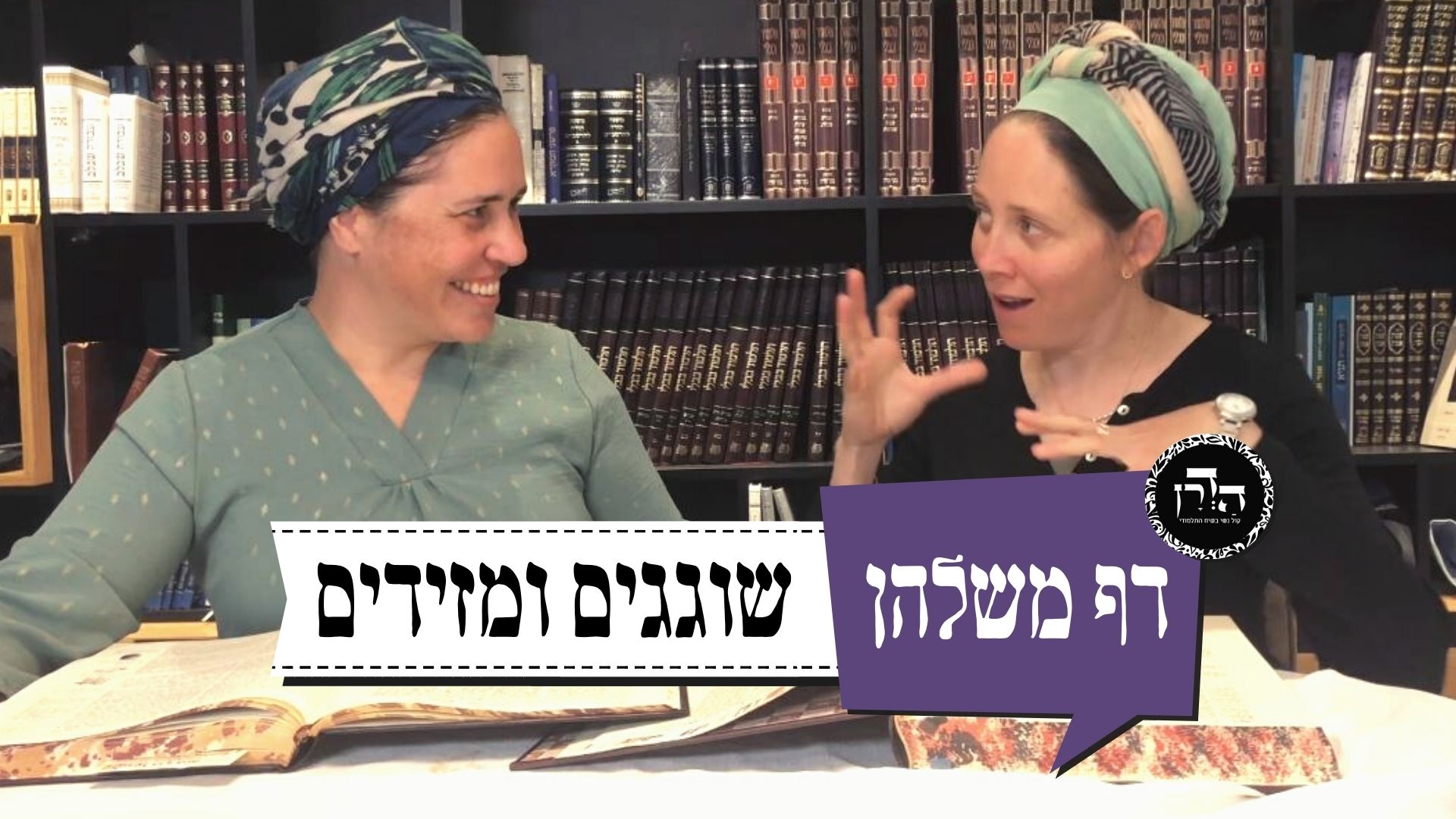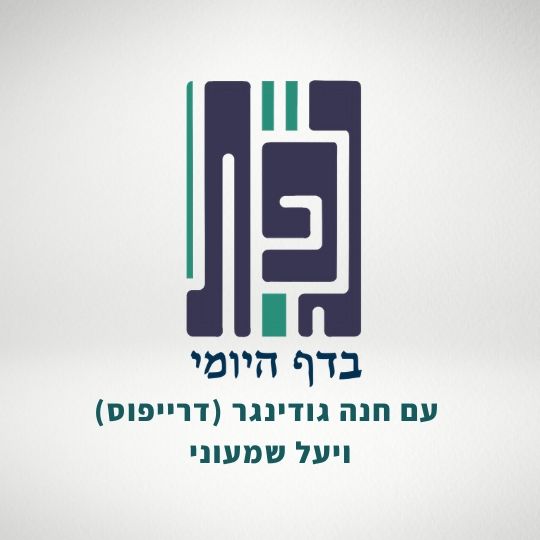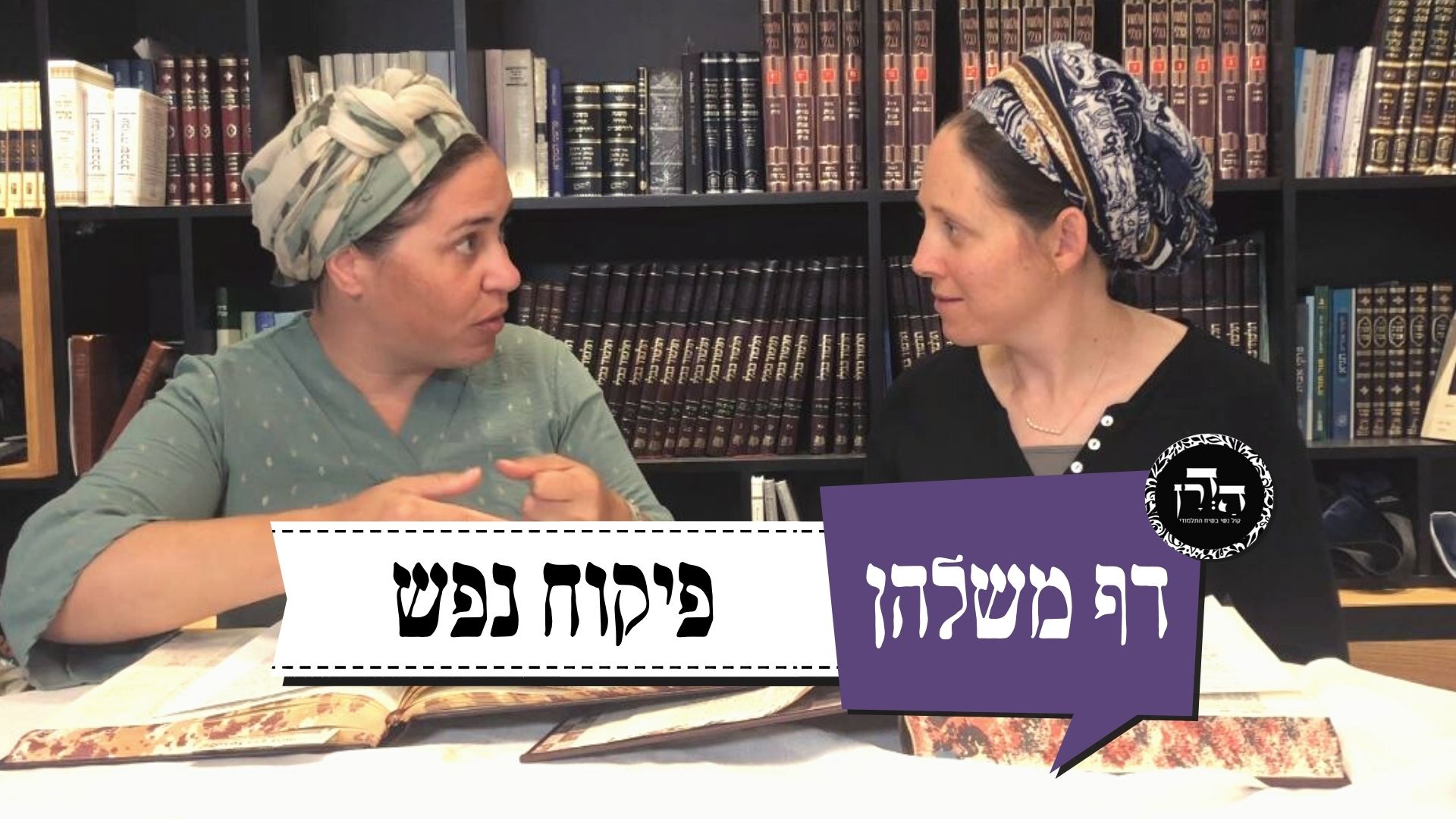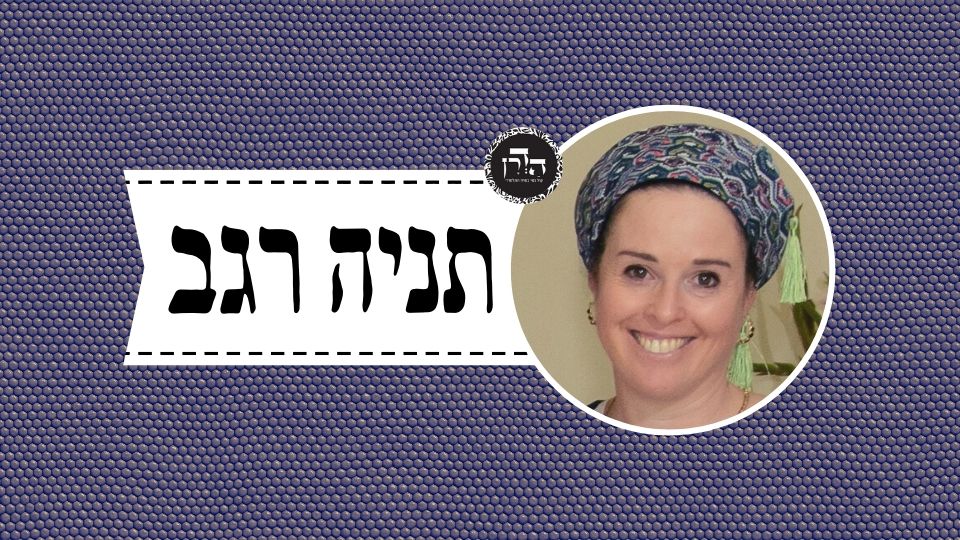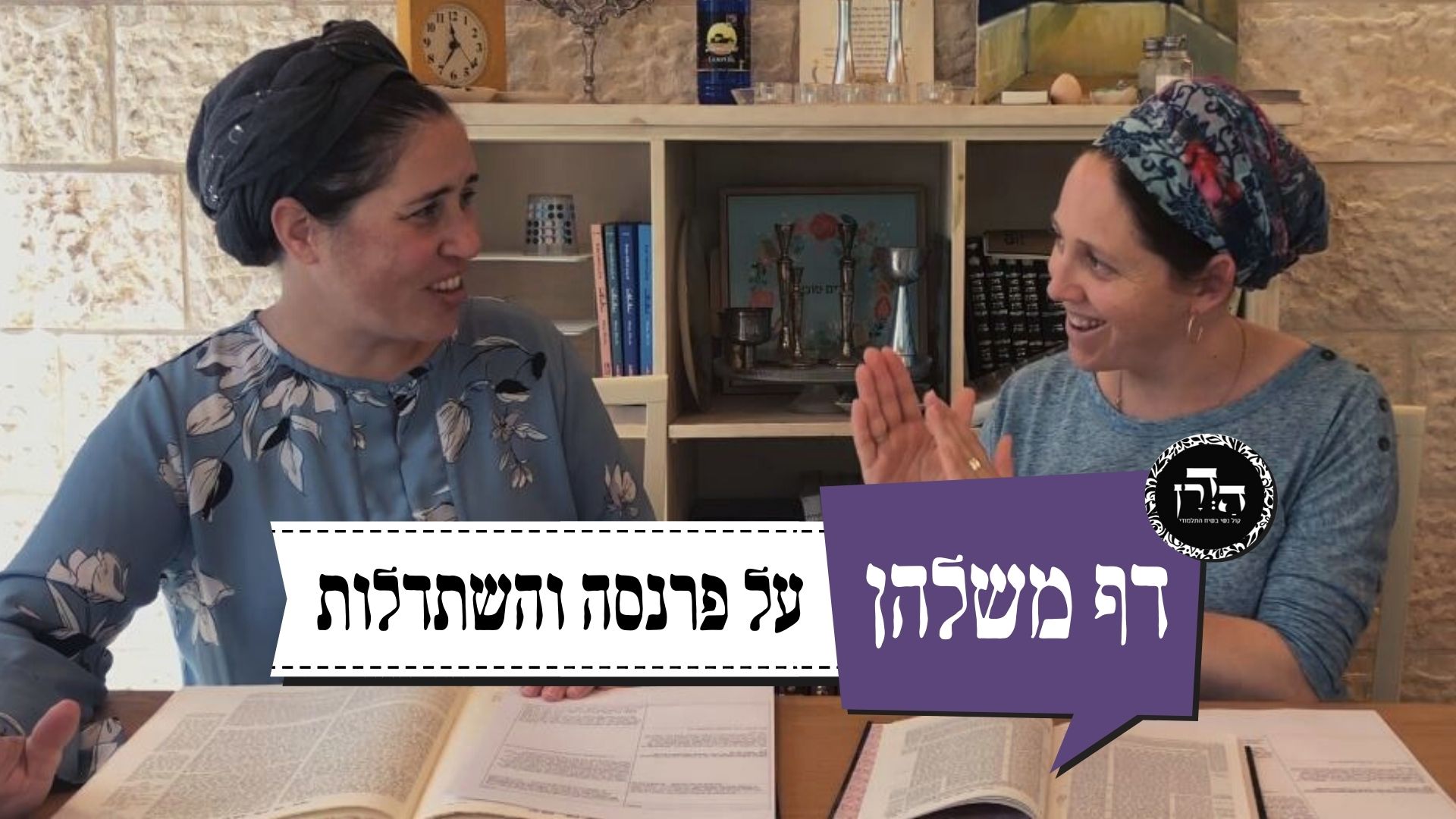ביצה לד
שֶׁצָּרִיךְ לְבׇדְקָן. וְאָמְרִי לַהּ: מִפְּנֵי שֶׁצָּרִיךְ לְחׇסְמָן.
it is necessary to test them to ensure that they do not burst when heated. If they are heated for the first time on a Festival, he will be thereby testing them, which is a prohibited labor. And some say: Because it is necessary to harden them by overheating them the first time to make them fit for use, which is considered preparing a vessel for use and is prohibited on a Festival.
תְּנַן הָתָם: דְּרָסָהּ אוֹ שֶׁטְּרָפָהּ בַּכּוֹתֶל, אוֹ שֶׁרְצָצַתָּה בְּהֵמָה וּמְפַרְכֶּסֶת, וְשָׁהֲתָה מֵעֵת לְעֵת וּשְׁחָטָהּ — כְּשֵׁרָה. אָמַר רַבִּי אֶלְעָזָר בַּר יַנַּאי מִשּׁוּם רַבִּי אֶלְעָזָר בֶּן אַנְטִיגְנוֹס: צְרִיכָה בְּדִיקָה.
In relation to the above, the Gemara cites the following teaching: We learned in a mishna there: If one trampled fowl with his foot, or threw it against a wall, or if an animal crushed it, and it is twitching but cannot stand; if the animal waited, i.e., remained alive, from the time of the injury until the same time twenty-four hours later, and he subsequently slaughtered it, it is kosher, provided no other defect is found in it that would have caused it to die within twelve months, which would render it a tereifa. Rabbi Elazar bar Yannai said in the name of Rabbi Elazar ben Antigonus: It requires examination after slaughtering, to make sure it does not have a defect.
בְּעָא מִינֵּיהּ רַבִּי יִרְמְיָה מֵרַבִּי זֵירָא: מַהוּ לְשׇׁחְטָהּ בְּיוֹם טוֹב? מִי מַחְזְקִינַן רֵעוּתָא בְּיוֹם טוֹב, אוֹ לָא?
In relation to the same issue, Rabbi Yirmeya inquired of Rabbi Zeira: What is the halakha with regard to slaughtering it on a Festival? Do we assume on a Festival that it has a flaw or not? In other words, may one rely on the assumption that a typical chicken has no defect? Or perhaps, since there is concern with regard to this particular bird and it requires examination, one should refrain from slaughtering it lest it turn out to be a tereifa. If so, he will have performed labor for no purpose.
אֲמַר לֵיהּ, תְּנֵינָא: אֵין מְלַבְּנִין אֶת הָרְעָפִים לִצְלוֹת בָּהֶן. וַהֲוֵינַן בַּהּ: מַאי קָא עָבֵיד? וְאָמַר רַבָּה בַּר בַּר חָנָה אָמַר רַבִּי יוֹחָנָן: הָכָא בִּרְעָפִים חֲדָשִׁים עָסְקִינַן, מִפְּנֵי שֶׁצָּרִיךְ לְבׇדְקָן.
He said to him in response: We already learned that one may not whiten tiles in order to roast on them. And we discussed it: What does he thereby do? And Rabba bar bar Ḥana said that Rabbi Yoḥanan said: Here we are dealing with new tiles, and the Sages prohibited heating them because one first needs to test them, and they might crack when heated. If they were heated for the first time on a Festival and cracked, it would show that they were unfit for use, in which case heating them would have been an unnecessary labor. This indicates that one may not take a chance on a Festival with regard to something that might be flawed, and therefore a possible tereifa should be similarly prohibited.
אֲמַר לֵיהּ: אֲנַן מִפְּנֵי שֶׁצָּרִיךְ לְחׇסְמָן מַתְנִינַן לַהּ.
He said to him: This is no proof; we learned that the reason for that halakha is because it is necessary to harden them in order to make them into proper vessels. Therefore, there is no connection between making a vessel and conducting an examination. Consequently, there is no reason to prohibit the slaughter of such a chicken on a Festival.
תַּנְיָא: אֶחָד מֵבִיא אֶת הָאוּר, וְאֶחָד מֵבִיא אֶת הָעֵצִים, וְאֶחָד שׁוֹפֵת אֶת הַקְּדֵרָה, וְאֶחָד מֵבִיא אֶת הַמַּיִם, וְאֶחָד נוֹתֵן בְּתוֹכוֹ תַּבְלִין, וְאֶחָד מֵגִיס — כּוּלָּן חַיָּיבִין. וְהָתַנְיָא: אַחֲרוֹן חַיָּיב וְכוּלָּן פְּטוּרִין! לָא קַשְׁיָא: הָא דְּאַיְיתִי אוּר מֵעִיקָּרָא, הָא דְּאַיְיתִי אוּר לְבַסּוֹף.
It is taught in a baraita: It is possible for several people to perform a single act of cooking on Shabbat, and all will be liable. How so? One brings the fire, and one brings the wood, and one places the pot on the stove, and one brings the water for the pot, and one puts spices into the food, and one stirs the pot; they are all liable for cooking. The Gemara wonders at this: But wasn’t it taught in a different baraita that the last one is liable and all the rest are exempt? The Gemara responds: This is not difficult. This case, where all are liable, is referring to a situation in which he brought fire at the outset, and therefore each of them performed part of the act of cooking; that case, where only the last one is liable, is referring to a situation in which he brought fire at the end. In that case, none of the earlier people performed any aspect of cooking at all, as the labor of cooking begins only from when fire is brought.
בִּשְׁלָמָא כּוּלְּהוּ קָא עָבְדִי מַעֲשֶׂה, אֶלָּא שׁוֹפֵת אֶת הַקְּדֵרָה מַאי קָא עָבֵיד? אָמַר רַבִּי שִׁמְעוֹן בֶּן לָקִישׁ: הָכָא בִּקְדֵרָה חֲדָשָׁה עָסְקִינַן, וּמִשּׁוּם לִבּוּן רְעָפִים נָגְעוּ בָּהּ.
The Gemara asks: Granted, all of them performed an action that constitutes a prohibited labor, and they are therefore partners in a prohibited act and the desecration of Shabbat. But the one who places the pot on the stove, what prohibited labor has he performed? Rabbi Shimon ben Lakish said: Here we are dealing with a new pot, and due to whitening tiles they applied the same prohibition to it. This means that one is not liable for cooking the food in the pot but for strengthening the pot itself, as is the case with heating tiles.
תָּנוּ רַבָּנַן: תַּנּוּר וְכִירַיִם חֲדָשִׁים — הֲרֵי הֵן כְּכׇל הַכֵּלִים הַנִּטָּלִין בֶּחָצֵר. אֲבָל אֵין סָכִין אוֹתָם שֶׁמֶן, וְאֵין טָשִׁין אוֹתָן בְּמַטְלִית, וְאֵין מְפִיגִין אוֹתָן בְּצוֹנֵן כְּדֵי לְחׇסְמָן, וְאִם בִּשְׁבִיל לֶאֱפוֹת — הֲרֵי זֶה מוּתָּר.
§ The Sages taught in the Tosefta: New ovens and stoves are similar to all vessels that may be carried in a courtyard on a Festival, as one can place items on them. However, one may not anoint them with oil, nor rub them with a rag, nor cool them with cold liquids to harden them, as all these actions are considered preparing the vessel for use, which may not be done on a Festival. And if one did so in order to bake in the oven on the Festival itself, this is permitted.
תָּנוּ רַבָּנַן: מוֹלְגִין אֶת הָרֹאשׁ וְאֶת הָרַגְלַיִם וּמְהַבְהֲבִין אוֹתָן בָּאוּר, אֲבָל אֵין טוֹפְלִין אוֹתָם בְּחַרְסִית, וְלֹא בַּאֲדָמָה, וְלֹא בְּסִיד. וְאֵין גּוֹזְזִין אוֹתָן בְּמִסְפָּרַיִם.
§ The Sages taught in the Tosefta: During a Festival one may scald the head and the feet of a slaughtered animal with hot water in order to remove the hairs from them, and one may singe them in fire for this purpose, but one may not smear them with clay, nor earth, nor lime in order to remove the hairs because this involves great effort, and it appears as though he is processing the skin. And one may not shear those hairs with scissors, as it appears as though he is performing the labor of shearing in an effort to obtain the hairs themselves.
וְאֵין גּוֹזְזִין אֶת הַיָּרָק בַּתִּסְפּוֹרֶת שֶׁלּוֹ. אֲבָל מְתַקְּנִין אֶת הַקּוּנְדָּס וְאֶת הָעַכָּבִיּוֹת, וּמַסִּיקִין וְאוֹפִין בְּפוּרְנִי, וּמְחַמִּין חַמִּין בְּאַנְטִיכִי, וְאֵין אוֹפִין בְּפוּרְנִי חֲדָשָׁה שֶׁמָּא תִּפָּחֵת.
Similarly, one may not trim the top of the leaves connected to the vegetable with its special shears, but one may prepare kundas and akaviyot, bitter vegetables that can be eaten only after extensive cooking, although this involves great effort. And one may kindle fire and bake in a large baker’s oven [purnei], and one may heat water in an antikhi, a kind of large urn, but one may not bake in a new baker’s oven lest it break. If the oven cracks when heated because it was not properly made, one will have performed unnecessary work on a Festival.
תָּנוּ רַבָּנַן: אֵין נוֹפְחִין בְּמַפּוּחַ, אֲבָל נוֹפְחִין בִּשְׁפוֹפֶרֶת. וְאֵין מְתַקְּנִין אֶת הַשַּׁפּוּד, וְאֵין מְחַדְּדִין אוֹתוֹ. תָּנוּ רַבָּנַן: אֵין מְפַצְּעִין אֶת הַקָּנֶה לִצְלוֹת בּוֹ מָלִיחַ, אֲבָל מְפַצְּעִין אֶת הָאֱגוֹז בְּמַטְלִית, וְאֵין חוֹשְׁשִׁין שֶׁמָּא תִּקָּרַע.
§ The Sages taught similarly in the Tosefta: One may not blow a fire with bellows, because this is the manner of a weekday activity, but one may blow a fire with a tube, in an unusual manner. And one may not mend a skewer nor sharpen it. The Sages further taught in the Tosefta: One may not break a reed in order to make a kind of skewer upon which to roast salted fish, but one may crack a nut covered with a rag, and there is no concern lest it tear, for even if this occurs, no prohibited labor has been performed.
מַתְנִי׳ וְעוֹד אָמַר רַבִּי אֱלִיעֶזֶר: עוֹמֵד אָדָם עַל הַמּוּקְצֶה
MISHNA: And Rabbi Eliezer further stated the following leniency: A person may stand over objects in storage, such as produce that he has for some reason previously set aside from use,
עֶרֶב שַׁבָּת בַּשְּׁבִיעִית, וְאוֹמֵר: מִכָּאן אֲנִי אוֹכֵל לְמָחָר. וַחֲכָמִים אוֹמְרִים: עַד שֶׁיִּרְשׁוֹם וְיֹאמַר מִכָּאן וְעַד כָּאן.
on Shabbat eve during the Sabbatical Year, during which no tithes are separated, which means one may take fruit on the following day without the need for any corrective measure, and say: From here, from these fruits, I will eat tomorrow. And the Rabbis say: He may not eat unless he marks the pile of fruit the day before and explicitly says: From here to there I will take.
גְּמָ׳ תְּנַן הָתָם: תִּינוֹקוֹת שֶׁטָּמְנוּ תְּאֵנִים מֵעֶרֶב שַׁבָּת וְשָׁכְחוּ וְלֹא עִשְּׂרוּ — לְמוֹצָאֵי שַׁבָּת לֹא יֹאכְלוּ אֶלָּא אִם כֵּן עִשְּׂרוּ. וּתְנַן נָמֵי: הַמַּעֲבִיר תְּאֵנִים בַּחֲצֵרוֹ לְקַצּוֹת — בָּנָיו וּבְנֵי בֵּיתוֹ אוֹכְלִין מֵהֶן עֲרַאי וּפְטוּרִים.
GEMARA: We learned in a mishna there: (Ma’asrot 4:2) Children who hid figs for themselves in a field on Shabbat eve in order to eat them on Shabbat, and they forgot and did not separate tithes, not only are they prohibited from eating them on Shabbat, for eating on Shabbat is always considered a fixed meal that obligates the produce in tithes, but even after the conclusion of Shabbat, they may not eat until they have separated tithes. And we also learned in a mishna: One who transfers figs in his courtyard in order to make them into dry figs, his children and the members of his household may in the meantime partake of them in a casual manner, and they are exempt from tithes. The fact that the fruit has reached his courtyard, as opposed to his house, is not enough to cause it to be liable for tithing.
בְּעָא מִנֵּיהּ רָבָא מֵרַב נַחְמָן: שַׁבָּת, מַהוּ שֶׁתִּקְבַּע מוּקְצֶה לְמַעֲשֵׂר בְּדָבָר שֶׁלֹּא נִגְמְרָה מְלַאכְתּוֹ? מִי אָמְרִינַן, כֵּיוָן דִּכְתִיב: ״וְקָרָאתָ לַשַּׁבָּת עוֹנֶג״, קָבְעָה וַאֲפִילּוּ בְּדָבָר שֶׁלֹּא נִגְמְרָה מְלַאכְתּוֹ, אוֹ דִלְמָא: בְּדָבָר שֶׁנִּגְמְרָה מְלַאכְתּוֹ — קָבְעָה, בְּדָבָר שֶׁלֹּא נִגְמְרָה מְלַאכְתּוֹ — לָא קָבְעָה?
Based on these two sources, Rava inquired of Rav Naḥman: With regard to Shabbat, what is the halakha in terms of whether it establishes an obligation to tithe food that has been muktze on Shabbat? Specifically, in the case of an item whose labor has not been completed, does the fact that the food is muktze on Shabbat give it the status of completely prepared food, or not? Do we say that since it is written: “And call Shabbat a delight” (Isaiah 58:13), this implies that any food one eats on Shabbat is considered a delight and not a casual meal, and therefore Shabbat establishes an obligation to tithe, as if the food were fully completed and fit to be eaten as a fixed meal, even for an item that has not had its labor completed? Or perhaps Shabbat establishes an obligation to tithe an item whose labor is completed, but regarding an item whose labor is not completed it does not establish an obligation to tithe?
אֲמַר לֵיהּ: שַׁבָּת קוֹבַעַת, בֵּין בְּדָבָר שֶׁנִּגְמְרָה מְלַאכְתּוֹ, בֵּין בְּדָבָר שֶׁלֹּא נִגְמְרָה מְלַאכְתּוֹ. אֲמַר לֵיהּ: וְאֵימָא שַׁבָּת דּוּמְיָא דְחָצֵר, מָה חָצֵר — אֵינָהּ קוֹבַעַת אֶלָּא בְּדָבָר שֶׁנִּגְמְרָה מְלַאכְתּוֹ, אַף שַׁבָּת — לֹא תִּקְבַּע אֶלָּא בְּדָבָר שֶׁנִּגְמְרָה מְלַאכְתּוֹ! אֲמַר לֵיהּ: תַּלְמוּד עָרוּךְ הוּא בְּיָדֵינוּ שֶׁהַשַּׁבָּת קוֹבַעַת, בֵּין בְּדָבָר שֶׁנִּגְמְרָה מְלַאכְתּוֹ, בֵּין בְּדָבָר שֶׁלֹּא נִגְמְרָה מְלַאכְתּוֹ.
Rav Naḥman said to Rava: Shabbat establishes the obligation for tithes, both with regard to an item whose work is completed and things whose work is not completed. Rava said to Rav Naḥman and challenged: But say that the law of Shabbat should be similar to that of a courtyard: Just as a courtyard establishes food placed inside it as a fixed meal with regard to tithes only when the work on an item is completed, so too, Shabbat should establish only an item whose work is completed as liable for tithing. Rav Naḥman said to Rava: I did not say this based on my own logic, which can be countered by logic of your own. Rather, we have it as an ordered teaching that Shabbat establishes both things whose work is completed and things whose work is not completed.
אָמַר מָר זוּטְרָא בְּרֵיהּ דְּרַב נַחְמָן: אַף אֲנַן נָמֵי תְּנֵינָא, וְעוֹד אָמַר רַבִּי אֱלִיעֶזֶר: עוֹמֵד אָדָם עַל הַמּוּקְצֶה עֶרֶב שַׁבָּת בַּשְּׁבִיעִית וְכוּ׳. טַעְמָא דִּשְׁבִיעִית — דְּלָאו בַּר עַשּׂוֹרֵי הוּא, הָא בִּשְׁאָר שְׁנֵי שָׁבוּעַ — הָכִי נָמֵי דְּאָסוּר, מַאי טַעְמָא — לָאו מִשּׁוּם דְּשַׁבָּת קָבְעָה?
Mar Zutra, son of Rav Naḥman, said: We, too, have learned in the mishna: And Rabbi Eliezer further stated that a person may stand over objects in the storage area on Shabbat eve during the Sabbatical Year and say: I will eat from here and here. The reason is that it is fruit of the Sabbatical Year, with regard to which one is not obligated to separate tithes. However, if it occurred in the other years of the Sabbatical cycle, so too, you will say that it is prohibited to eat them without separating tithes. What is the reason for this? Is it not because Shabbat establishes them with regard to tithes, and consequently they may not be eaten until tithes have been separated?
לָא, שָׁאנֵי הָתָם, כֵּיוָן דְּאָמַר: ״מִכָּאן אֲנִי אוֹכֵל לְמָחָר״ — קָבַע לֵיהּ עִלָּוֵיהּ. אִי הָכִי מַאי אִרְיָא שַׁבָּת, אֲפִילּוּ בְּחוֹל נָמֵי! הָא קָא מַשְׁמַע לַן דְּטֶבֶל מוּכָן הוּא אֵצֶל שַׁבָּת, שֶׁאִם עָבַר וְתִקְּנוֹ — מְתוּקָּן.
The Gemara refutes this: This is no proof, for there it is different: Since he said: From here I will eat tomorrow, he has immediately established for himself a meal with them, by stating his intention to eat the food as it is. The Gemara asks: If so, why does the mishna mention particularly Shabbat? Even if one said so on a weekday the same should also apply. Since he has set them aside for his meal, they are considered finished and are liable to tithes. The Gemara answers: This comes to teach us the following: One should not conclude that untithed produce is inherently muktze because one may not separate the tithes and eat it; rather, it is considered prepared with regard to Shabbat, in that if one transgressed the words of the Sages and corrected it by separating the tithes, it is considered corrected.


